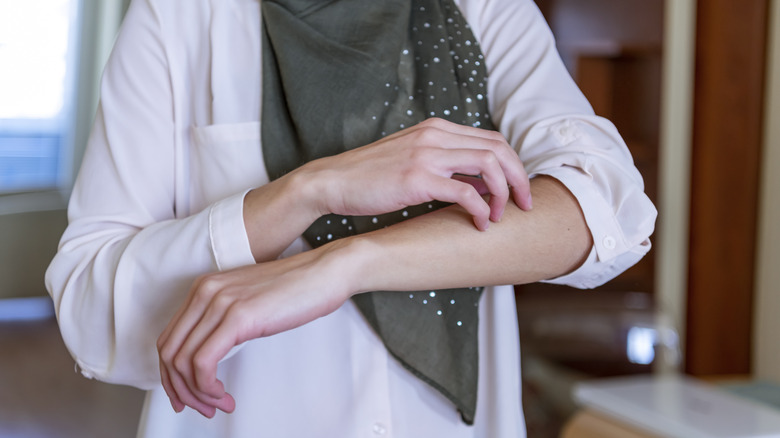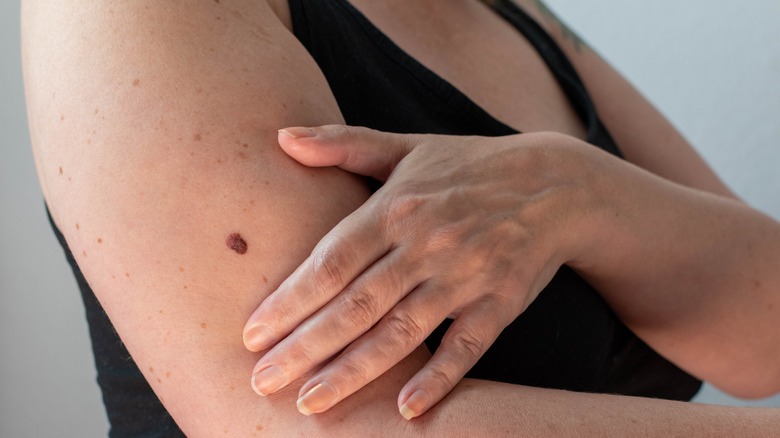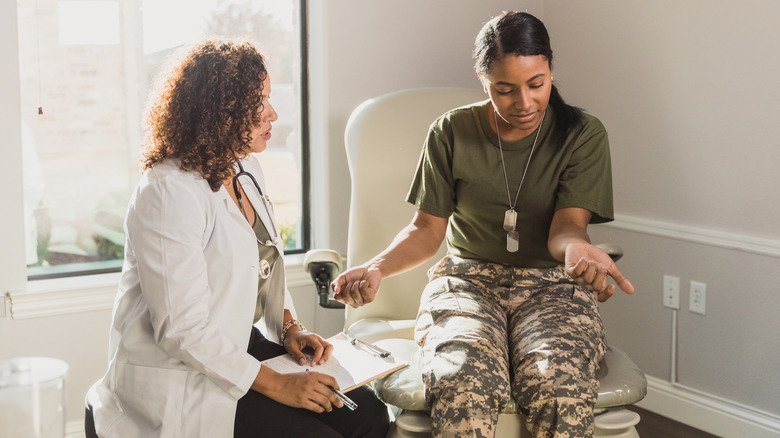How To Tell If Your Itchy Skin Could Be Cancer
It's not unusual to find yourself scratching at a patch of itchy skin every now and again. Mosquito bites, dry air, or certain health conditions like eczema can all cause itching on the skin's surface. In some cases, though, itchy skin can be indicative of a larger issue, such as cancer.
In a 2014 study published in JAMA Dermatology, researchers looked at itching as a symptom associated with three different types of skin cancer. This included basal cell carcinomas, squamous cell carcinomas, and melanomas. The study findings showed that while the overall prevalence rate of itching among all three skin cancer subtypes was nearly 37%, itching had the weakest connection with melanomas.
While it may seem counterintuitive, experts at the Dana-Farber Cancer Institute explain that itching is not predominantly associated with skin cancer. However, there are some specific cases in which it can be. Here's what you need to know.
Types of cancers associated with itching
In cases of skin cancer, itching will likely present alongside abnormal skin changes. Therefore, it's important to be on the lookout for the development of new moles or changes in their size or color. Itchy moles have been linked to melanoma, but the itching will only be isolated to the area rather than the entire body, reports the Dana-Farber Cancer Institute. The same is true for squamous cell carcinoma and basal cell carcinoma.
However, there are other types of cancers to which itching may also be related other than skin cancer. This includes certain blood cancers, such as lymphoma and polycythemia vera (PV). Lymphoma can be further broken down into Hodgkin's lymphoma and non-Hodgkin's lymphoma. Those with Hodgkin's lymphoma may be more prone to itching, as it has been reported to affect as many as 20% of cases. Polycythemia vera (PV) is characterized by an overproduction of red blood cells by the bone marrow. Exposure to warm or hot water can prompt itching in these patients.
Signs that you should call your physician
Alternatively, itching may sometimes be related to certain gastrointestinal cancers, such as liver cancer, pancreatic cancer, and gallbladder cancer (via Dana-Farber Cancer Institute). The itching stems from blocked bile ducts that prompt the skin to turn yellow in color, a condition known as obstructive jaundice. However, the kind of itching associated with these cancers usually occurs alongside other symptoms. Therefore, if itching is your only symptom, it is likely not gastrointestinal cancer.
But what about some commonly itchy areas, such as the armpits? Is this a sign that a person may be at increased risk for cancer? Although some people with inflammatory breast cancer may feel itchy, it is often in tandem with additional symptoms. Therefore, a bout of itchy armpits can more often be traced to contact dermatitis or poor hygiene practices.
It's important to be vigilant about the health of our skin, but we don't want to panic every time we feel the urge to scratch. At what point should you consider speaking to your doctor? Experts at Healthline say it's best to consult with your physician if your itchy skin is accompanied by discharge, yellowing, blistering, crusting, or if your urine appears brown in color. The same is true if you notice any skin changes or if itching persists beyond a couple of days.



